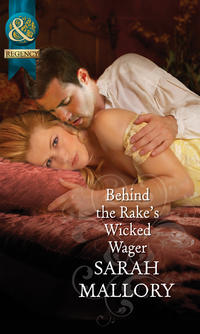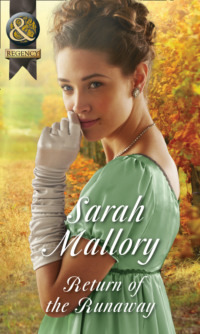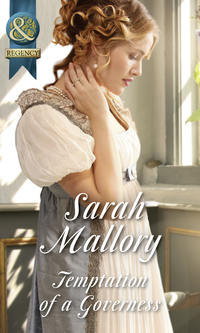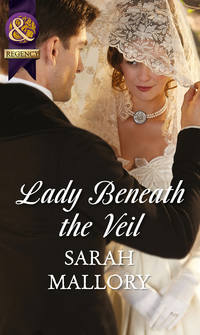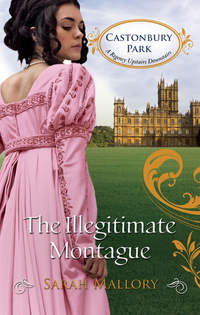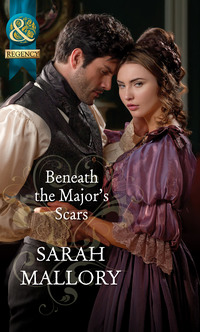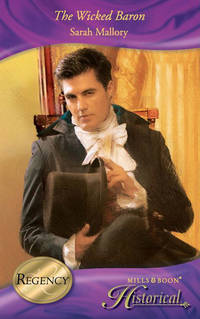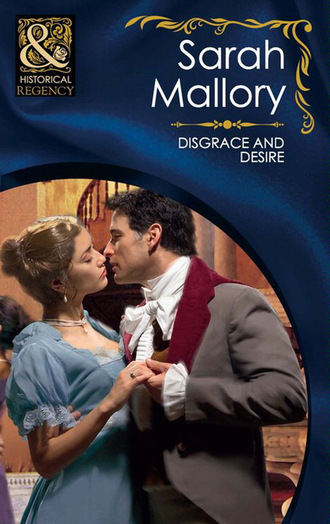
Полная версия
Disgrace And Desire
‘But the woodland is very profitable for me.’
Lord Berrow’s response convinced her that he had at least been giving her proposal some thought.
‘Of course it is, sir, and we would give you a fair price. The wood could provide timber for the building and of course firewood. However, if the trust cannot buy it then perhaps you would allow us to put in a road, my lord. The project is not viable unless we have access to the town.’
‘Well, we shall see, we shall see.’ He smiled down at her. ‘And just what is this project you are planning?’
Eloise clasped her hands.
‘A foundling hospital, my lord. As you know, the plight of the poor is so much worse since the war ended—’
‘A foundling hospital?’ he exclaimed, horrified. ‘No, no, no, that will never do.’
‘My lord, I assure you—’
‘No, no, madam. Out of the question.’ He shifted away from her, shaking his head. ‘I cannot support such a scheme.’
Eloise was shocked.
‘But my lord, I thought you would be in favour of it! After all, you are a great friend of Wilberforce and his Evangelical set, and I read your speeches to the House, in favour of reform…’
‘Yes, yes, but that is different. A foundling hospital would bring the very worst sort of women to Allyngham, and I spend a great deal of time in Norfolk. I could not countenance having such an institution in the area.’ Lord Berrow stood up. ‘I am sorry, my dear, but I think you should consider some other plan to honour your husband.’
With a little bow he walked off, leaving Eloise wondering what to do next. She had not expected such strong opposition from the Earl. She wondered if he would perhaps be more amenable once he had had time to think about the idea. She hoped so, and decided to renew her argument again in a few days.
Eloise noticed that several of the gentlemen were looking in her direction and she realised that to be sitting alone in the alcove might be construed as an invitation. Even as the thought occurred to her she saw one fashionably dressed gentleman excusing himself from a little group and making his way towards her. Recognising Sir Ronald Deforge, she quickly slipped out of the alcove and lost herself in the crowd.
‘Lady Allyngham.’
Eloise whipped round to find Jack Clifton behind her.
‘What are you doing here?’
‘I came to find you.’
She hunched one shoulder at him.
‘Then you have wasted your time, Major Clifton,’ she said coldly. ‘I will not talk to you.’
He grabbed her wrist as she turned away, saying urgently, ‘I want to apologise.’
‘I do not care what you want!’ she hissed at him, wrenching her hand free.
Quickly she pushed her way through the crowds, never pausing until she reached the ante-room. There she glanced around and was obliged to stifle a tiny pang of disappointment when she discovered the major had not followed her. She saw Mrs Renwick coming out of the card-room and went to join her, hoping to avoid any further unwelcome attentions by staying close to the lady and her friends. The ploy worked very well, and she was just beginning to think that she might soon be able to make her excuses and leave without arousing too much speculation when a footman approached and held out a silver tray.
Eloise looked doubtfully at the folded note resting on the tray.
‘What is this?’ she asked, suspicion making her voice sharp.
A flicker of surprise disturbed the servant’s wooden features.
‘I do not know, my lady. The under-footman brought it into the ballroom and requested that I deliver it to you.’
One of Mrs Renwick’s companions leaned closer.
‘Ah, an admirer, my dear!’
The arch tone grated upon Eloise, but she merely smiled. Carefully, she picked up the note.
‘Thank you; that will be all.’
She dismissed the footman and stepped away from the little group of ladies. They were all regarding her with varying degrees of curiosity. She hoped her own countenance was impassive as she opened the note and read it.
Go into the garden and look under Apollo’s heel.
Eloise stared at the words, trying to work out their meaning. She realised one of the ladies was stepping towards her and hurriedly folded the note.
‘So, Lady Allyngham, is it an admirer?’
She looked into the woman’s bright, blatantly curious face and forced herself to laugh.
‘What else?’ she said lightly. ‘One is pursued everywhere. Excuse me.’
Her mind was racing. Apollo. A statue, perhaps. She remembered that the long windows of the grand salon had been thrown open, recalled seeing the ink-black sky beyond. She did not know what lay beyond the windows: she had no choice but to find out.
Eloise returned to the salon. The noise and chatter of the room was deafening and she began to make her way around the edge of the room until she reached the first of the long windows. Looking out, she could see a narrow terrace with a flight of steps at each end. Eloise took a quick look around to make sure no one was watching her and slipped out on to the terrace. From her elevated position she could see the dark outlines of the garden and in the far distance, at the perimeter of the grounds, a series of lanterns glowed between several pale figures: marble statues.
In seconds she had descended the steps and was running along the path, the gravel digging painfully into the thin soles of her blue kid slippers. The moon had not yet risen and the gardens were dark, the path only discernible as a grey ribbon. She thought she heard a noise behind her and turned, her heart beating hard against her ribs. She could see nothing behind her except the black wall of the house rearing up, pierced by the four blocks of light from the long windows.
She hurried on, past the rose garden where the late-summer blooms were still perfuming the air, and on through a tree-lined walk. The path led between two rows of clipped yews and was in almost total darkness but at the far end she could see the garden wall and hanging from it the first of the lanterns. Emerging from the yew walk, she saw the statue of a woman ahead of her, the marble gleaming ghostlike in the lamplight. She approached the statue and noted that the path turned to the right and ran past five more statues, each one illuminated by a lamp. She put her hand to her throat: the third statue was clearly male, and holding a lyre in his arms. She stepped forward: yes, it could be Apollo. She moved closer, peering at the base of the statue. One marble heel was slightly raised and tucked beneath it was a small square of folded paper.
Eloise bent to pick it up. She unfolded it, turning the writing towards the golden glow of the lantern. Her heart, thudding so heavily a moment earlier, now stopped. She had expected to find another note but this was obviously a page torn from a book. A journal, judging by the dates in the margin. It was covered with a fine, neat hand that was all too familiar. As she read the page she put a hand to her mouth, her eyes widening with horror. The sentiments, the explicit nature of the words—innermost thoughts that would cause a scandal if they were made public. A scandal that could destroy both her and Alex.
For a sickening moment Eloise thought she might faint. Then, as her brain started to work again, she quickly refolded the paper and thrust it into the bosom of her gown. Her spine began to tingle, and she had the uneasy feeling that she was being watched. She backed away from the statue, straining her eyes and ears against the surrounding darkness. The air was very still and the only sound to reach her was the faint chatter of the guests gathered in the house. Suddenly she wanted nothing more than to be standing safely in that overheated, overcrowded salon. She picked up her skirts and began to run back along the path, trying not to think of who or what might be hiding in the darkness around her. The steps to the terrace were within sight when a figure stepped out and blocked her path. She screamed and tried to turn away. Strong hands reached out and grabbed her, preventing her from falling.
‘Easy, my lady. There is no need to be afraid.’
Recognising Jack Clifton’s deep warm voice did nothing to calm her. The noise coming from the open windows above was such that she felt sure no one had heard her scream and no one would hear her now, if she called out for assistance. Fighting down her panic, she shrugged off his hands.
‘You persist in tormenting me,’ she said in a low, shaking voice.
She heard him laugh and gritted her teeth against her anger.
‘You wrong me, madam. I saw you slip away, so I came outside to wait for you. I thought, perhaps, when you came back from your assignation, I might speak with you.’ His teeth gleamed in the dim light. ‘I did not expect you to return as if the hounds of hell were snapping at your heels.’
She peered at him, trying to read his face, but it was impossible in the gloom.
‘You know why I went into the garden?’
She sensed rather than saw him shrug.
‘I presumed it was to meet a gentleman.’ On this occasion his opinion of her character did not arouse her anger. ‘So now will you accept an apology for my behaviour this morning, madam?’
She said cautiously, ‘I might do so.’
‘Then I humbly beg your pardon. My conduct was not that of a gentleman.’
He was so close, so reassuringly solid, but could she trust him? She glanced nervously over her shoulder. If Major Clifton had not sent her that note, then who could it be? She looked up at him. ‘Did you see anyone else in the gardens, Major?’
‘No. What is it, Lady Allyngham, did not your lover keep the assignation?’
His coldly mocking tone banished all thoughts of seeking his help. She gave a little hiss of anger.
‘You are quite despicable!’
‘And you are hiding something.’
She drew herself up.
‘That,’ she said icily, ‘is none of your business!’
Jack did not move as the lady turned and ran quickly up the steps and into the house. There was a mystery here: she had seemed genuinely frightened when she came running up to him. If it had been any other woman he would have done his best to reassure her, but Lady Allyngham had made it abundantly clear what she thought of him. And she could take care of herself, could she not? He thought back to that morning, when he had held her in his arms before she wrathfully fought him off. He toyed with the idea of following her and persuading her to confide in him. Then he shrugged. As the lady had said, it was none of his business.
Jack decided to leave. He had come to Clevedon House in search of Lady Allyngham, determined to deliver his apology and he had done so. There was now no reason for him to stay: he took no pleasure in being part of the laughing, chattering crush of guests gathered in the elegant salon. A discreet enquiry at the door elicited the information that Lady Allyngham had already departed and since there was no other amusement to be had, he made his way directly to his rooms in King Street. He decided not to call in at White’s. He had business to conclude in the morning and needed to have a clear head. After that, he thought, he would be glad to quit London and forget the bewitching, contradictory Lady Allyngham.
Chapter Three
The following morning Jack took a cab into the City. His first meeting with his lawyer had convinced him that he was right to sell out and take charge of his inheritance, or what was left of it. Now he quickly scanned the papers that were put before him.
‘Once the property in Leicestershire is sold that will give me capital to invest in the Staffordshire estates,’ he decided.
His lawyer’s brows went up.
‘The Leicestershire estate was your father’s pride and joy: he always said the hunting there was second to none.’
‘I shall have precious little time for hunting for the next few years,’ muttered Jack, looking at the figures the lawyer had written out for him. He pushed the papers back across the desk. ‘You say you have a buyer?’
The lawyer steepled his fingers, trying to keep the note of excitement out of his voice. Years of dealing with old Mr Clifton had made him cautious.
‘The owner of the neighbouring property, a Mr Tomlinson, has indicated he is interested in purchasing the house and the land. He is eager to have the matter settled. He is a manufacturer, but a very gentlemanly man.’
‘As long as he can pay the price I don’t care who he is.’ Jack rose. ‘Very well. Have the papers drawn up for me to sign tomorrow, and I’ll leave the rest to you.’
Ten minutes later Jack walked out into the street, feeling that a weight had lifted from his shoulders. He had always preferred Henchard, the house in Staffordshire. It had been his mother’s favourite, but sadly neglected after her death, his father preferring to live in London or Leicestershire. He had died there following a short illness eighteen months ago, but with Bonaparte gathering his army and Wellington demanding that every able soldier join him in Brussels, Jack had not had time to do more than to send to Henchard any personal effects he wanted to keep before rejoining his regiment. Now he planned to settle down. He would be able to refurbish Henchard, and in time the land might even be profitable again. Settling his hat on his head, he decided to walk back to King Street. He had reached the Strand and was approaching Coutts’s bank when a heavily veiled woman stepped out of the door, escorted by a very attentive bank clerk. Despite the thick veil there was something familiar about the tall, fashionably dressed figure, her purposeful tread, the way her hands twisted together. As she pulled on her gloves he caught sight of the heavy gold ring on her right hand. Even from a distance he recognised Allyngham’s signet ring. Jack smiled to himself, wondering what the lady would say if he approached her. Would she give him a cold, frosty greeting, or perhaps she might simply refuse to acknowledge him? Even as he considered the matter she swept across to a waiting cab and climbed in. Instantly the door was closed and the carriage pulled away.
‘Well, Miss Elle? Is your business ended, can we go home now?’
Eloise put up her veil and gave her maid a strained smile.
‘Yes, Alice, we are going back to Dover Street now.’
The maid gave a little sniff. ‘I do not see why we couldn’t use your own carriage, if you was only coming to the bank. It may be unusual for ladies to visit their bankers, but if they are widows, like yourself, I don’t see what else is to be done.’
Eloise did not reply. Leaning back in one corner, she clutched her reticule nervously. It rested heavily on her knees but she would not put it away from her. She had never been inside a bank before, but the manager himself had taken charge once he realised her identity, and the whole process had been conducted with the utmost ease. When she had said she needed to draw a substantial amount to distribute to her staff he had given her a look which combined sympathy with mild disapproval: no doubt he thought that she really required the money for some much more trivial reason, such as to buy new gowns or to pay off her gambling debts.
She pulled a paper from her bag and unfolded it: the scrawling black letters might have been live serpents for the way they made her skin crawl. When the letter had arrived that morning and she had read it for the first time, she had felt very alone. Her first thought had been to send for Alex, but she had soon dismissed the idea. Alex was a dear friend, but he could be rash, and this matter required discretion. No, she must deal with this herself. She scanned the letter again, chewing at her lip. Her biggest problem now was how to get through the rest of the day?
Mrs Renwick was a little surprised when Eloise appeared at her card party that evening.
‘I know I had sent my apologies,’ said Eloise, giving her hostess a bright smile, ‘but I was not in humour for dancing tonight and thought you would not object…’
‘Not in the least, my dear, you are most welcome here. Come in, come in and join our little party.’ Mrs Renwick drew her towards a quiet room filled with small tables, where ladies and gentleman were gathered, staring at their cards in hushed concentration. Bathed in the glow of the candles, it looked like a room full of golden statues. ‘This is turning out to be an evening of pleasant surprises. Major Clifton, too, made an unexpected appearance. It seems his business in town will not now be concluded until tomorrow so we have the pleasure of his company, too—’
Eloise drew back quickly. She had spotted Jack Clifton on the far side of the room.
‘No! I—I was hoping for something a little…less serious, ma’am.’
Her hostess laughed softly. ‘Well if you would like to come into the morning room, some of our friends are playing looe for penny points: nothing too alarming in that, now is there?’
Resigning herself to an hour or so of tedious play, Eloise smiled and took her place between a bouncing, bubbly young lady fresh from the schoolroom and an emaciated dowager in heavy black bombazine. Concentrating on the cards proved a surprisingly effective distraction for Eloise and when the little group split up to go in search of refreshment she was relieved to note that her evening was nearly over.
She made her way downstairs to the dining room where a long table was loaded with a sumptuous array of food and drink. A little supper might help to settle the nervous anticipation that was beginning to build within her. A group of gentlemen were helping themselves to delicacies from an assortment of silver dishes. She noted that both Major Clifton and Sir Ronald Deforge were amongst their number so she avoided them and made her way to the far end of the table. She kept her eyes lowered, determined to concentrate on the food displayed before her but the gentlemen’s light-hearted banter intruded and she could not help but listen. The conversation turned to gambling and she found her attention caught when she heard the major’s voice.
‘You know I play the occasional game at White’s but the high stakes are not for me,’ he was saying. ‘You will think me very dull, I dare say, but I prefer my funds to be invested in my land, rather than lining some other fellow’s pockets.’
‘Very different from Sir Ronald, then,’ laughed Edward Graham. ‘You never refuse a game of chance, ain’t that right, sir?’
‘If it is cards, certainly,’ Sir Ronald replied cheerfully. ‘I have something of a passion for cards. I played young Franklyn ’til dawn last week.’
‘Then you have more energy for the pastime than I do,’ returned the major coolly, turning away.
‘I hear that playing ’til dawn is a common occurrence with you, Deforge,’ remarked Mr Renwick. ‘By Gad, sir, your servants must be falling asleep at their posts if they have to wait up for you every night.’
Sir Ronald laughed.
‘No, no, Renwick, I am not so cruel an employer. My household retires at a Christian hour. Only my valet waits up for me, and he snoozes in a chair in the hall until I give him the knock to let me in.’
‘The pleasures of being a bachelor,’ declared his host. ‘A wife would certainly curtail your nocturnal activities, Deforge!’
‘Oho, when have I ever prevented you doing exactly as you wish?’ demanded Mrs Renwick, walking by at that moment. ‘My husband would have you think his life very restricted.’ She tapped the straining front of Mr Renwick’s waistcoat with her fan. ‘Well, gentlemen? Does he look as if he is wasting away?’
Eloise gave a little chuckle as her hostess came towards her.
‘I am sure we will all find something to tempt our appetite here,’ she smiled. ‘A truly magnificent supper, ma’am.’
‘Thank you, Lady Allyngham. Are you enjoying yourself?’
‘Yes, thank you. It is a most delightful evening.’
‘But, my dear, you are very quiet this evening, and a trifle pale, I think.’ Mrs Renwick came closer. ‘I hope you are not ill?’
‘No, ma’am, a little tired, perhaps.’
Mrs Renwick gave her a warm, sympathetic smile.
‘Too many engagements, ma’am?’
‘I think perhaps I have had enough of town life.’
Overhearing, Mr Graham turned quickly towards her.
‘My dear Lady Allyngham, you will not desert us!’
‘Of course she will not,’ put in Lady Parham, coming up. ‘Not when there are so many diversions to be enjoyed.’
Eloise forced herself to smile. Suddenly she was tired of play-acting.
‘I think I may well go back to Allyngham.’
‘Ah,’ nodded Lady Parham. ‘Perhaps that is why you were in the Strand this morning, settling your affairs with your bankers.’
Eloise stiffened. ‘No, I had no business there today.’
‘Oh, I was so sure it was you!’ Lady Parham gave a tinkling little laugh, glancing around at her friends. ‘I had gone to Ackerman’s, to look at their new prints—so amusing!—and I saw a lady coming out of Coutts’s bank. But she was veiled, so perhaps I was mistaken.’
‘It must have been someone else,’ said Eloise firmly. ‘I was not in the Strand this morning.’
She selected a little pastry and turned away, only to find Jack Clifton regarding her with a little frown in his eyes.
Now what the devil is she about?
Jack had been watching Lady Allyngham for some time. He had noted that she was nervous, her eyes constantly straying to the clock, and her vehement denial of visiting the bank aroused his suspicions. She caught his eye and moved away so fast he abandoned any thought of speaking to her, but when, a short time later, Eloise made her excuses and left the party, he followed.
The press of traffic in the streets made it an easy task for Jack to follow her carriage on foot, and when they arrived at Dover Street he was close enough to hear the lady’s instructions to the coachman to come back in an hour.
Jack grinned. So she was up to something! He dashed back to King Street, quelling the little voice in his head that objected to the idea of spying on a lady. After all, Tony Allyngham had been a good friend and had asked him to look after his widow—well, perhaps not in so many words, but Jack was not going to admit, even to himself, that he had any personal interest in Eloise Allyngham.
Just over half an hour later he was back in Dover Street, his evening coat replaced by a dark riding jacket and with a muffler covering his snowy neckcloth. Hidden out of sight in Dover Yard, Bob was looking after his horse and in all probability, Jack thought, animadverting bitterly on the ways of the Quality. He positioned himself opposite Lady Allyngham’s door and settled down to wait. As with many of the streets in this area of London, Dover Street housed a variety of residents, from members of the ton to ladies who, while they would never receive an invitation from the great society hostesses, were very well known to their husbands. Courtesans such as Kitty Williams who, it was rumoured, could boast of having a royal duke amongst her many admirers. Jack was not one of their number, but Kitty’s residence had been pointed out to him by his friends, and he watched with interest as an elegant town carriage pulled up at the door. A portly gentleman climbed out and was immediately admitted, as if the doorman had been looking out for him. So Lord Berrow was one of Kitty’s customers. Jack grinned: the Earl professed himself to be one of Wilberforce’s saints—the old hypocrite!
The sounds of another coach clattering into Dover Street caused Jack to step back further into the shadows. He nodded with satisfaction as it drew up outside Lady Allyngham’s house. He saw Eloise come out, wrapped now in a dark cloak, and step up into the carriage. It drew away immediately and Jack turned and ran for his horse.
‘I still think I should come with you,’ grumbled Robert as Jack scrambled into the saddle.
‘No, you go back now and wait for me.’ Jack patted his pocket. He had a pistol, should he need it, and besides, he forced himself to face the thought, if this should prove nothing more than a sordid little assignation with a lover, the less people who knew of it the better.


